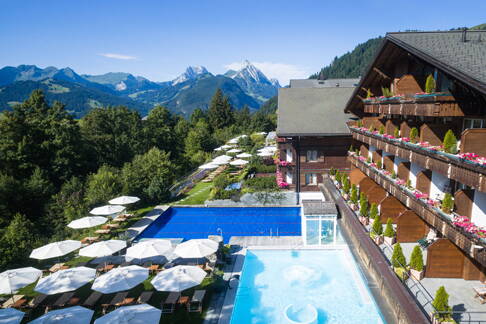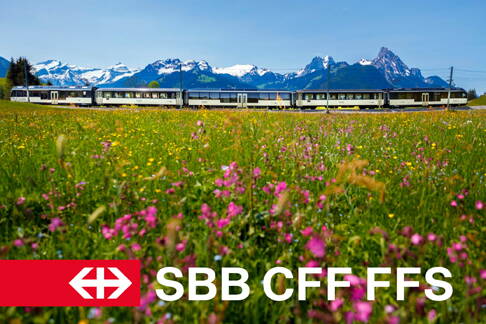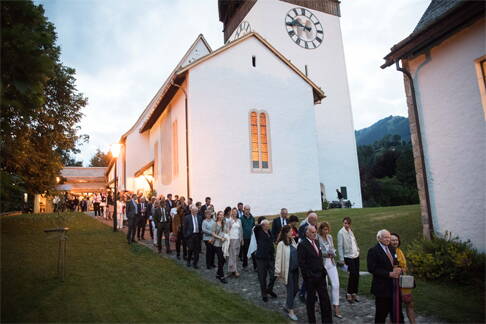Time and Eternity – Music for the Planet II – Trans-cendence V
Orchestral Concert
Saturday, 10 August 2024
7.30 pm, Saanen Church
In Patricia Kopatchinskaja’s “Time and Eternity”, the music revolves around pivotal moments of transformation, the aftermath of catastrophic wartime events, but also around hope. In 1939, Karl Amadeus Hartmann composed his Concerto funebre fueled by outrage and despair in response to the horrors of the Nazi regime, a threat that loomed over European civilization. The Concerto funebre can be understood as a passionate expression, a reflection on the suffering inflicted upon humanity, all living beings, the very essence of creation, and, by extension, the Creator (God?) himself. In his Polyptyque (a violin concerto composed in 1973 for Yehudi Menuhin), Frank Martin translated the Passion of Christ into music, drawing inspiration from images by Duccio di Buoninsegna (ca. 1255 – 1319) found on the reverse side of the renowned Maestà altarpiece in Siena. Frank Martin was deeply inspired by the Passion narrative, which conveys the idea that God empathises with the misery of temporal existence. According to Christian beliefs, His suffering leads to redemption in the Eternal – a beacon of hope in times of peril, including the challenges posed by climate change.
Please keep in mind that the concerts of the “Music for the Planet” series will be accompanied by audiovisual elements. Expect some pieces to be presented in unique and unconventional ways.
Patricia Kopatchinskaja, Violin & Direction
Camerata Bern
Pascal Viglino, Percussion
Beata Würsten, Sarah Würsten, Monika Würsten, Song
Wieslaw Pipczynski, Accordion
| Audiovisual concert, curated by Patricia Kopatchinskaja (featuring a projection of a series of paintings depicting the Passion on the back of the Maestà altar in Siena, painted by Duccio di Buoninsegna (ca. 1255 – 1319, Siena), which inspired Frank Martin for the composition of his “Polyptyque”). | |
| John Zorn (1953) | |
| “Kol Nidre” | |
| Karl Amadeus Hartmann (1905-1963) | |
| “Concerto funebre” for Violin and String Orchestra | |
| Tadeusz Sygietyński (1896-1955) | |
| “Dwa serduszka” [Two hearts] | |
| Trad. | |
| “Вы жертвою пали” [Immortal victim], funeral march | |
| Guillaume de Machaut (ca. 1300-1377) | |
| “Messe de Nostre Dame” – I. Kyrie (arr. for string orchestra) | |
| Frank Martin (1890-1974) | |
| Polyptyque for Violin and 2 Small String Orchestras – I. Image des Rameaux | |
| Johann Sebastian Bach (1685-1750) | |
| “Ach grosser König”, choral from the St John Passion, BWV 245 (arr. for string orchestr) | |
| Frank Martin (1890-1974) | |
| Polyptyque for Violin and 2 Small String Orchestras – II. Image de la Chambre haute | |
| Johann Sebastian Bach (1685-1750) | |
| “Als Jesus Christus in der Nacht”, choral, BWV 265 (arr. for string orchestr) | |
| Frank Martin (1890-1974) | |
| Polyptyque for Violin and 2 Small String Orchestras – III. Image de Judas | |
| Johann Sebastian Bach (1685-1750) | |
| “Durch dein Gefängnis”, choral from the St John Passion, BWV 245 (arr. for string orchestr) | |
| Frank Martin (1890-1974) | |
| Polyptyque for Violin and 2 Small String Orchestras – IV. Image de Gethsémané | |
| Johann Sebastian Bach (1685-1750) | |
| “Wer hat dich so geschlagen”, choral from the St John Passion, BWV 245 (arr. for string orchestr) | |
| Frank Martin (1890-1974) | |
| Polyptyque for Violin and 2 Small String Orchestras – V. Image du Jugement | |
| Luboš Fišer (1935-1999) | |
| “Crux” for Violin, Timpani and Bells | |
| Frank Martin (1890-1974) | |
| Polyptyque for Violin and 2 Small String Orchestras – VI. Image de la Glorification | |
| Johann Sebastian Bach (1685-1750) | |
| “O grosse Lieb”, choral from the St John Passion, BWV 245 (arr. for string orchestr) | |
| 100' | |
| CHF 130/110/70/40 |




